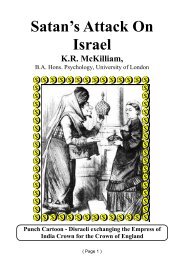Curse of Cannan - The New Ensign
Curse of Cannan - The New Ensign
Curse of Cannan - The New Ensign
You also want an ePaper? Increase the reach of your titles
YUMPU automatically turns print PDFs into web optimized ePapers that Google loves.
Rt. Hon. W. F. Bailey, in his book, "Jews <strong>of</strong> the War Zone," p. 227, notes that "<strong>The</strong> Jews <strong>of</strong><br />
Bosnia are named 'Spagnolo'."<br />
C. H. Norman notes in "A Searchlight on the World War," p. 42, that "the originals were worded<br />
in Spanish. It is within the writer's knowledge [as he was connected with an endeavor to form<br />
an English Lodge <strong>of</strong> the Grand Orient, from which he withdrew on learning <strong>of</strong> the real nature<br />
<strong>of</strong> this confederacy against European safety] that the language used by the Polish Dept. <strong>of</strong> the<br />
grand Orient for communication with its agents in the Balkans is Spanish."<br />
Ambassador Gerard, in his book "My Four Years in Germany," p. 137, notes, "I was able to<br />
converse with some Serbians in the first days <strong>of</strong> the war in their native tongue, which, curiously<br />
enough, was Spanish."<br />
In fact the language was not Spanish, but a language defined in the Encyclopaedia Judaica as<br />
"Ladino," also known as "Latino," "a Judeo-Spanish spoken and written language <strong>of</strong> Jews <strong>of</strong><br />
Spanish origin after expulsion in 1492 by Ferdinand and Isabella [<strong>The</strong> execution <strong>of</strong> Ferdinand<br />
may have been a symbolic revenge for this historic event. Ed.]." <strong>The</strong> Encyclopaedia Judaica<br />
notes various forms <strong>of</strong> Ladino: "Oriental Ladino" spoken in Constantinople and Smyrna, and<br />
"Western Ladino" spoken in Salonika, Bosnia, and Serbia. Many <strong>of</strong> the refugees from Spain<br />
settled in Serbia, where they ever afterward conversed in their private tongue, Western Ladino.<br />
Pozzi's book, "Black Hand Over Europe," notes <strong>of</strong> "A Mr. Stevens, who spoke Spanish, whose<br />
job was to shoot the murderers at Sarajevo after they had performed the assassination, so that<br />
they could not reveal the plot."<br />
<strong>The</strong>se revelations bear out the insistence <strong>of</strong> Albert Pike to Mazzini some forty years earlier to<br />
involve the nations <strong>of</strong> the world in three world wars. Grant Richards, in "<strong>The</strong> Cause <strong>of</strong> World<br />
Unrest," 1920, p. 144, comments on the Committee for Union and Progress: "Indeed, I can go<br />
so far as to say that the Union for Progress was practically born in the Masonic Lodge called<br />
'Macedonia Risorta' established by the Salonikan Jew, Emannuele Carass .... though Freemasonry<br />
was forbidden in Turkey, there were two lodges in Salonika under the Grand Orient <strong>of</strong> Italy."<br />
Mathias Erzberger, in "Experience in the Great War," stresses that the Grand Orient <strong>of</strong> Italy was<br />
completely under the control <strong>of</strong> the Grand Orient <strong>of</strong> France; he refers to the transfer <strong>of</strong> 700,000<br />
francs from Paris to Rome between the Grand Orients on behalf <strong>of</strong> the Jewish charitable trust,<br />
Alliance Israelite Universelle; this is the funding which was provided for the assassination at<br />
Sarajevo.<br />
McCurdy's "<strong>The</strong> Truth About the Secret Treaties," 1925, quotes on page 45 the article published<br />
in 1914, "After Vivordan," by Ljuba Jovanovitch, president <strong>of</strong> the Serbian Parliament and<br />
Minister <strong>of</strong> Education, "I do not remember if it were the end <strong>of</strong> Mayor the beginning <strong>of</strong> June<br />
when one day, M. Pashitch told us that certain persons were preparing to go to Sarajevo, in order<br />
to kill Franz<br />
Ferdinand, who was expected there on Vivordan, Sunday, June 28th. He told this much to us<br />
and others, but he acted further in the <strong>of</strong>fice only with Stefan Protitch, then Minister <strong>of</strong> the<br />
Interior; this was prepared by a society <strong>of</strong> secretly organized men. Protitch and the whole cabinet<br />
<strong>of</strong> Serbia knew <strong>of</strong> the plot. King Alexander, the Russian Minister Hartwig, and the Russian<br />
military attache Artmanov were in on the plot. M. Pashitch's nephew was a member <strong>of</strong> the Black<br />
Hand; he was the link between Protitch and the conspirators. <strong>The</strong> agent <strong>of</strong> the Black Hand in<br />
Sarajevo was Gatchinovitch. <strong>The</strong> Black Hand where the murder plans had long been laid was<br />
known by and encouraged by the government <strong>of</strong> Serbia. Printzip confessed that it was through<br />
Ciganovitch that they had been referred to Major Tankositch, supplied with weapons, and given<br />
shooting lessons. After the Salonika trial, the Pashitch government sent Ciganovitch, as a reward<br />
for his services, to America with a false passport under the name <strong>of</strong> Danielovitch. After the war,<br />
Ciganovitch returned and the government gave him land near Usakub, where he then resided ....<br />
Dimitryevitch, who was chief <strong>of</strong> intelligence, who led in the assassination <strong>of</strong> King Alexander<br />
and the Queen in 1903, was executed in Salonika in 1918 to silence him about Sarajevo."<br />
( Page 99)
















